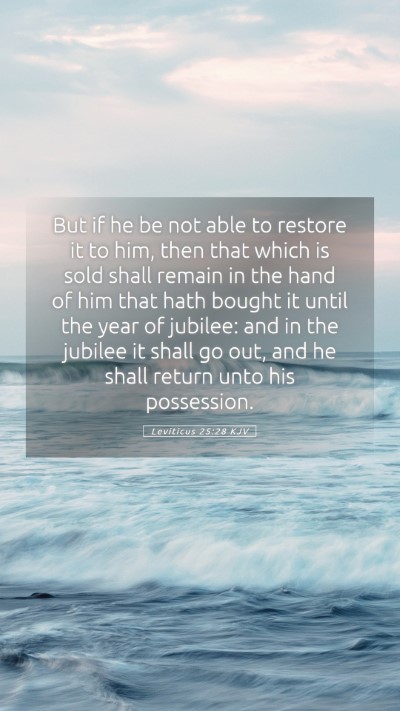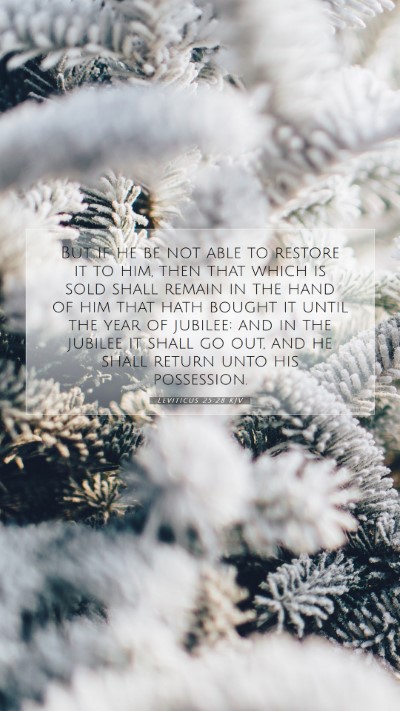Meaning and Interpretation of Leviticus 25:28
Leviticus 25:28 states:
"But if he is not able to have it restored to him, then what he sold shall remain in the hand of the buyer until the year of Jubilee; in the Jubilee it shall be released, and he shall return to his property."
Bible Verse Meanings and Context
This verse is part of the larger context of the laws concerning the Year of Jubilee, a significant event in Israelite society established by God. The Jubilee occurred every fifty years and involved the restoration of land to its original owners and the release of debts.
Commentary Insights
- Matthew Henry: Henry emphasizes the principle of redemption and mercy in these laws. He details how God provides a mechanism for restoring ownership and financial stability to families. The verse reinforces the idea that property ultimately belongs to God, and humans are stewards of it.
- Albert Barnes: Barnes highlights the importance of the Jubilee in preventing perpetual poverty and social injustice. He notes that this law encourages compassion among the Israelites, reminding them of their responsibilities toward their fellow countrymen.
- Adam Clarke: Clarke discusses the cultural and economic implications of the Jubilee. He explains that it alleviated extreme wealth disparities and ensured that land remained within families, thus preserving the economic integrity of Israelite society.
Scripture Analysis
The analysis of Leviticus 25:28 reveals several theological and practical themes:
- Redemption: The provision for the buyer to hold the land until the Jubilee signifies hope for the original owner, reflecting God's desire for restoration.
- Social Justice: The laws of the Jubilee act as a safeguard against the exploitation of the poor, reinforcing the idea that God cares about societal equality.
- Divine Ownership: The concept that the land belongs to God reminds believers of their role as caretakers, aligning with broader biblical teachings about stewardship.
Understanding Scripture
To understand Leviticus 25:28 fully, one must consider:
- The historical context of Israelite culture and economy.
- The religious significance of the Jubilee as a divine appointment for restoration.
- The overall narrative of the Bible that emphasizes themes of grace, redemption, and community responsibility.
Application of Bible Verse
This verse offers practical applications for modern believers:
- Personal Finances: Understanding the principles of debt relief and generosity promotes a more equitable financial practice.
- Social Responsibility: Encouraging individuals to care for those in need aligns with the biblical mandate to love one’s neighbor.
- Hope and Restoration: The redemption aspect instills a sense of hope for personal and communal restoration in difficult circumstances.
Additional Bible Cross References
- Exodus 21:2-6 - Laws regarding Hebrew servants and their release.
- Leviticus 25:10 - Proclamation of liberty throughout the land.
- Deuteronomy 15:1-2 - Remission of debts every seven years.
Conclusion
Leviticus 25:28 encapsulates profound biblical principles such as justice, redemption, and divine ownership that still resonate today. Through this verse and its interpretations, believers can gain valuable insights into living a life that reflects God’s character and values. For those involved in bible study groups or seeking bible study resources, this verse serves as a powerful reminder of God's love for humanity and His desire for justice and restoration.


